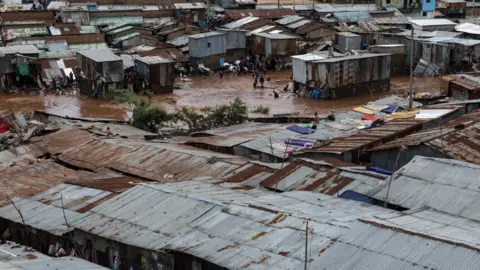Torrential rains pounded Nairobi, leading to devastating floods that swept away 6 people and caused widespread destruction across the city.
As the capital grapples with the aftermath of the deluge, urgent action is needed to address both the immediate impact of flooding and the underlying issue of climate change.
President William Ruto has directed the formation of a multi-agency response team to deal with the floods, recognizing the severity of the situation.
However, opposition leader Raila Odinga has called for the government to declare the floods a national disaster, emphasizing the need for swift and coordinated action to mitigate the crisis.
The floods have highlighted the vulnerability of Nairobi’s infrastructure and the urgent need for improved drainage systems and floodplain management. Poor drainage, rapid urbanization, and climate change-induced extreme weather events have all contributed to the city’s susceptibility to flooding.
With heavy rainfall, water runoff overwhelms the existing drainage infrastructure, leading to floods in low-lying areas and informal settlements. As a real estate and urban planning expert, it is crucial to explore effective strategies for controlling flooding once it wreaks havoc in the city.
One of the key solutions lies in the development of integrated drainage systems designed to efficiently manage stormwater. This involves upgrading and expanding existing drainage networks, constructing new drainage channels, and incorporating sustainable drainage techniques such as permeable pavements and green infrastructure.
Effective floodplain management is essential for minimizing the risk of flooding in Nairobi. This includes delineating flood-prone areas, implementing zoning regulations to restrict development in high-risk zones, and preserving natural floodplains as green spaces or buffer zones.
Nairobi Governor Johnson Sakaja has attributed the calamity to encroachment of riparian lands and blocked waterways, emphasizing the importance of halting all approvals for development in flood-prone areas.
The county has announced plans to demolish buildings built on river banks and wetland areas to prevent further loss of life.
Investment in resilient infrastructure is paramount to addressing the challenges posed by flooding. This includes the construction of flood defenses such as levees, embankments, and retention ponds to contain floodwaters and prevent inundation of urban areas.
Additionally, upgrading roads, bridges, and culverts to withstand extreme weather events can enhance the city’s resilience to flooding and ensure the continuity of essential services during emergencies.
In addition to addressing immediate flood response measures, Nairobi must also prioritize long-term solutions to climate change. Climate resilience and adaptation strategies, such as sustainable urban planning, green infrastructure, and disaster risk reduction initiatives, are essential for building a more resilient city.
Climate change poses a significant threat to Nairobi’s future, exacerbating the frequency and intensity of extreme weather events such as floods.
As such, concerted efforts are needed to reduce greenhouse gas emissions, transition to renewable energy sources, and promote sustainable development practices.
The recent floods serve as a stark reminder of the urgent need to address climate change and its impact on Nairobi’s residents and infrastructure.
By implementing proactive measures to mitigate flood risk and tackle climate change, the city can build a more sustainable and resilient future for all.


















